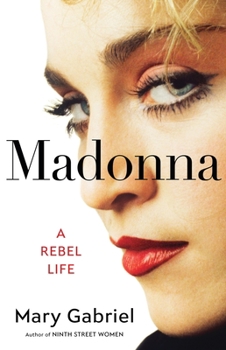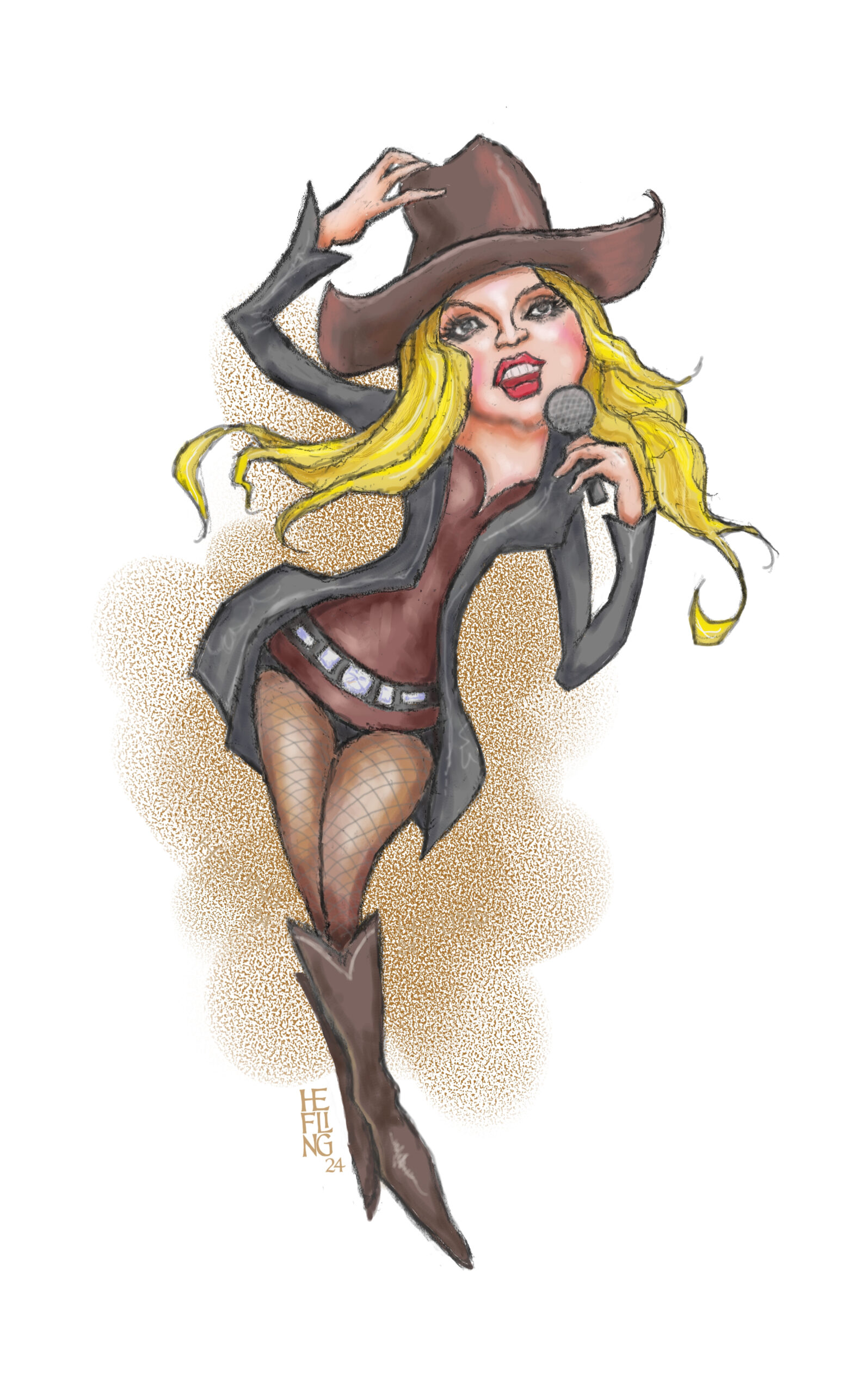THE CELEBRATION TOUR
Madonna
October 14, 2023 – May 4, 2024
 MADONNA
MADONNA
A Rebel Life
by Mary Gabriel
Little, Brown and Company
319 pages, $38.
THE ARRIVAL of Madonna: A Rebel Life, by Mary Gabriel, could not have been better timed. In the fall of 2023, the pop star launched a concert tour, which she called “Celebration,” as a showcase of her greatest hits. The tour was abruptly stalled by a health scare and hospitalization for a bacterial infection. Madonna, as always, survived, and she played the Gloria Gaynor hit “I Will Survive” to reinforce this fact once she hit the road for her twelfth world tour. This coincided with her recertification by the Guinness World Records as the biggest-selling female artist of all time (more than 400 million records sold).
The Queen of Pop is unique in that she has maintained her mainstream appeal while holding onto a loyal gay male fanbase. “Each generation has its female ‘gay icon,’ from Mae West to Elizabeth Taylor to Judy Garland to Bette Midler,” writes Gabriel. “But for many—perhaps most—lgbtq people born between 1960 and 1980, the female icon is Madonna.” I wrote about her in this magazine when she turned fifty years old. She’s now 65 and surprisingly spry for her age, though she sported a knee brace during the tour. Gabriel relays one of the artist’s admissions: “[I am a] broken doll held together with tape and glue.” During a Seattle performance, a male backup dancer, in high heels, dropped her and, true to form, the Material Girl laughed it off. She kept singing, lying on the stage, perhaps in keeping with her song “Over and Over” (1984), in which she offers this advice: “And if I fall, I get up again now.”
 Much has been made of the fact that Gabriel’s biography is 819 pages long, but for fanboys like me, 819 pages isn’t nearly enough. As diva lit goes, Barbra Streisand’s new memoir, My Name Is Barbra, is 992 pages long, while Britney Spears’ The Woman in Me is a slender 275. Eschewing the written word, Madonna is determined to direct a biopic about her own life, but she pulled the plug on the project after hazing a string of actresses who were all vying for the starring role. The book is divided into six parts, each based on Madonna’s various residences (Michigan, New York, Los Angeles, Miami, London, and Lisbon).
Much has been made of the fact that Gabriel’s biography is 819 pages long, but for fanboys like me, 819 pages isn’t nearly enough. As diva lit goes, Barbra Streisand’s new memoir, My Name Is Barbra, is 992 pages long, while Britney Spears’ The Woman in Me is a slender 275. Eschewing the written word, Madonna is determined to direct a biopic about her own life, but she pulled the plug on the project after hazing a string of actresses who were all vying for the starring role. The book is divided into six parts, each based on Madonna’s various residences (Michigan, New York, Los Angeles, Miami, London, and Lisbon).
In this unauthorized biography, Gabriel traces Madonna’s lifelong obsession with gay men to a number of formative figures: Christopher Flynn, a ballet teacher who introduced her to Detroit’s club scene; her openly gay younger brother (also Christopher); and artist Keith Haring, whom she befriended after relocating to New York City with only $35 in her pocket. For Gabriel, what cemented Madonna’s status as a gay icon was not so much her sexual carnality as her AIDS activism. A quotation by Larry Kramer—“Can we fight together?”—serves as an epigraph for a chapter on Madonna’s meteoric rise in the 1980s. We learn that she not only visited patients in the AIDS wing at Saint Vincent’s hospital but crawled into bed with them and cracked jokes. Dying and in a mental fog, the men called her “mother.” In the current Celebration tour, she performs “Live to Tell” while images of gay men, notably Haring and Flynn, along with Robert Mapplethorpe and Freddie Mercury, appear on individual screens before the images quickly multiply to show hundreds of people who also died. Even Elton John, Madonna’s longtime nemesis, was impressed and said: “We’re deeply moved by the heartfelt tribute from Madonna during her Celebration tour performance of ‘Live to Tell’ honoring the 40.4 million people we have lost to AIDS.”
Madonna: A Rebel Life is exhaustively researched—at least five footnotes pepper every page—and the final word of the epilogue reflects Madonna’s overall theme of “celebration.” Ever since “American Life” (2001), which flopped because it was critical of American society while the nation was dusting itself off after September 11th, Madonna has been smuggling her politics into pop music. My hands-down favorite is “Batuka,” from 2019’s Madame X, with its swipe at former President Donald Trump: “Get that old man/ Put him in a jail.” None of this newer material is performed in the current show, which is proudly nostalgic: Madonna wanted to take a bow after revisiting her chart-topping singles, from “Everybody” to “Like A Prayer.” Gabriel writes: “In 2023 Madonna made another announcement. Madonna was headed back out on tour … a look into the rearview of her life. She called it simply Celebration.” But it’s a cautious kind of celebration, joyous but also anxious about what lies ahead.
Way back in 1984, after performing “Holiday” on American Bandstand, Madonna was asked by the late Dick Clark: “What do you hope will happen, not only in 1984 but for the rest of your professional life? What are your dreams? What’s left?” She replied, with her characteristic confidence, in four famous words: “To rule the world.” That was four decades ago, and that limitless ambition is what drives her to this day. “Don’t tell me to stop,” she sang on 2000’s “Don’t Tell Me.” Like it or not, it’s still Madonna’s world, and we just live in it.
Colin Carman, who teaches English at Colorado Mesa University, has an article in the newly published book Romantic Women’s Writing and Sexual Transgression (Edinburgh University Press).




